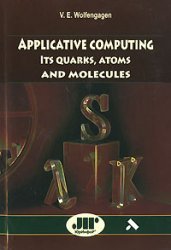
Applicative Computing: Its quarks, atoms and molecules
by V. E. Wolfengagen
Publisher: JurInfoR 2010
ISBN/ASIN: 5891581779
ISBN-13: 9785891581777
Number of pages: 66
Description:
This work covers the advanced topics in main ideas of computing in general. The material is approved in practice of NRNU MEPhI, MIPT and several other educational centers of the Russian Federation. The book is suitable both for advanced learners and beginners in Computing and Information Technologies as well as in Discrete Mathematics.
Download or read it online for free here:
Download link
(multiple formats)
Similar books
 Rule-based Computation and Deduction
Rule-based Computation and Deductionby Helene Kirchner, Pierre-Etienne Moreau - ESSLLI
This text first introduces the concept of rewriting which is behind rule-based systems. Then the rewriting logic and the rewriting calculus are defined and shown to be especially suited to describing concurrent and non-deterministic computations.
(9022 views)
 Introduction to Theory of Computation
Introduction to Theory of Computationby Anil Maheshwari, Michiel Smid - Carleton University
This is a textbook for an undergraduate course on the Theory of Computation. Contents: Finite Automata and Regular Languages; Context-Free Languages; Turing Machines and Church-Turing Thesis; Decidable and Undecidable Languages; Complexity Theory.
(10361 views)
 Cellular Automata And Complexity: Collected Papers
Cellular Automata And Complexity: Collected Papersby Stephen Wolfram - Westview Press
These original papers on cellular automata and complexity provide a highly readable account of what has become a major new field of science, with important implications for computer science, physics, economics, biology, and many other areas.
(13921 views)
 Models of Computation: Exploring the Power of Computing
Models of Computation: Exploring the Power of Computingby John E. Savage - Addison-Wesley
The book re-examines computer science, giving priority to resource tradeoffs and complexity classifications over the structure of machines and their relationships to languages. This viewpoint is motivated by more realistic computational models.
(9743 views)